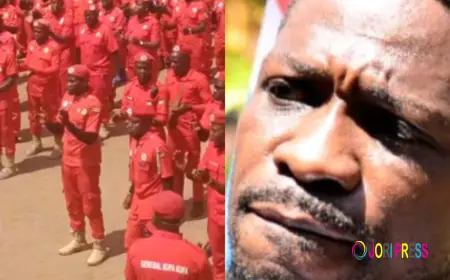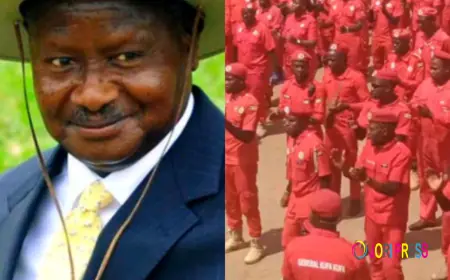The Namboole Renaissance


For so long, Ugandan football has lived in the twilight of pragmatism. It was football played with a grimace, with clenched fists and gritted teeth, built on graft and not grace. Milutin “Micho” Sredojević embodied that era — a coach whose pragmatism was mistaken for necessity, whose tactical systems were more about survival than transcendence. To his credit, he carved results from stone, willed the Cranes into battles where spirit replaced silk, but his philosophy seldom offered the kind of vision that a footballing nation, starved of aesthetic joy, yearned for. That pragmatic cloak became a comfort blanket, and Ugandans settled for the illusion of stability at the cost of evolution.
And yet, beneath that cloak lay a deep-seated yearning for identity. Uganda’s problem has never been a lack of talent; it has always been the inability to forge that talent into a coherent expression of the game. Sébastien Desabre flirted with the idea of a bolder, offensive identity during his tenure, especially at the 2019 Africa Cup of Nations, where the Cranes produced their most compelling modern display against DR Congo in a 2–0 victory. But Desabre’s ideas left with him, and what followed was a tumble into managerial uncertainty. Johnathan McKinstry tinkered without imprint, Micho returned with the same pragmatic gospel, and the years between 2019 and 2023 became lost time. Ugandan football stagnated. 

It is in this context that Paul Put feels like a coach who arrived too late, but precisely when his vision was most desperately needed. Watching the Uganda Cranes dismantle Mozambique 4–0 under the floodlights at Namboole felt less like a football match and more like a grand unveiling of what Ugandan football could have been had Put’s gospel been embraced sooner. The grass glistened under the new hybrid surface, the stadium hummed with the electricity of thirty-five thousand voices, and what unfolded was not merely victory but domination. Every department of the game — from the goalkeeper’s command to the fullbacks’ offensive forays, from the midfield’s recyclers of possession to the wide men’s tireless pressing — sang in unison, a performance so complete that it rendered comparisons almost unfair.
It began at the back, where Salim Jamal Magoola offered the kind of stability that the Cranes had been crying out for. His presence was more than just a pair of hands; it was command, composure, and calm in the storm. Unlike his understudy Joel Mutakubwa — whose misjudgements in the CHAN tournament, particularly against South Africa, handed away goals like gifts on Christmas morning — Magoola radiated assurance. He marshalled his area, organized his defenders, and made even the most routine save an act of authority. Behind him, Uganda had not a last line of defense, but a first line of belief. 
In front of him stood a backline anchored by the now-constant figure of Elio Capradossi. He is not merely a defender but a leader of the line, reading the game with clairvoyant anticipation, stepping in with impeccable timing, and when the night’s drama allowed it, even etching his name onto the scoresheet. Beside him, John Obita, on debut, played with the grace of a man born into the Cranes jersey. His composure, football etiquette, and positional awareness suggested not the tentative steps of a debutant, but the footprints of a baller with pedigree. On the flanks, Elvis Bwomono and Aziz Kayondo were tireless engines. Bwomono at right back was disciplined, solid, and efficient, while Kayondo on the left roamed with offensive conviction, turning defense into attack with every stride. Together, this back four didn’t just defend; they dictated, they dared, and they dominated.
In midfield, the axis of Khalid Aucho and Kenneth Semakula functioned like the beating heart of Put’s vision. Aucho, the captain and anchorman, provided the steel and voice, shielding the defense while distributing with purpose. Alongside him, Semakula proved once again that he is no mere utility man. He is the recycler par excellence, the player who receives under pressure and transforms chaos into calm, the one who gives a platform for others to flourish. It was from their double pivot that the Cranes’ offensive tempo was constructed, the balance of grit and guile upon which the orchestra of attack could find its rhythm.
And then there was Allan Okello. If ever a player embodied the burden of expectation, it was he. Criticized mercilessly after his no-show in the CHAN quarterfinal against Senegal — a match that saw Uganda bow out meekly — Okello entered Namboole with questions hanging over him like storm clouds. What he delivered was not just an answer, but a manifesto. His long-range strike to open the scoring was as much a statement of intent as it was a goal, a reminder of his immense talent and his ability to deliver when trust and balance surround him. He did not stop there. With vision and precision, he orchestrated attacks, set up two more goals, and imposed himself as the conductor of Uganda’s symphony. If there was a toss-up for man of the match between him and Rodgers Mato, Okello’s sheer influence tipped the scale. 


Mato, too, deserves his ovation. Off the left flank, he was irrepressible, a player who grows with every game. His brace was not just about goals but about reliability — the mark of a player who shows up when it matters. And on the opposite flank, Jude Ssemugabi, underrated and understated, played the role of the relentless worker. His consistency, his pressing, his willingness to do the dirty work without complaint, set the tone for Uganda’s high-octane approach in the early stages. He is the kind of player who rarely makes headlines, but without whom the system falls flat. Even the lead striker, Steven Desse Mukwala, criticized for his rash decisions in the final third, was vindicated by his relentless pressing and work rate. He may not have found the net, but his fingerprints were on the very fabric of the Cranes’ offensive intent. 
All of this, every layer of brilliance, every note in the night’s chorus, returns to Paul Put. Here is a man whose philosophy is not about containment but about expression. He has given the Cranes what they lacked for years — an identity. This was not a game won by luck or by the occasional flash of individual brilliance; it was won by a coherent vision, drilled into every player, executed in harmony, and celebrated by a nation. Where Micho’s pragmatism reduced Uganda to cautious participants, Put’s audacity has made them protagonists.
When was the last time Uganda dominated a game like this? Perhaps the 2–0 win over DR Congo at AFCON 2019, where Desabre’s charges played with a freedom that left us yearning for more. But even then, Uganda’s history is littered with victories that felt more like isolated miracles than sustainable philosophies. The 1–0 against Egypt in 2017 was historic but reactive, a disciplined act of defiance rather than an exhibition of dominance. Against Mozambique, however, there was no doubt who the better team was. From the first whistle to the last, Uganda dictated, dismantled, and dazzled.
The cruel truth is that Paul Put should have come sooner. Had he arrived in the aftermath of 2019, when Desabre’s departure left a vacuum, Uganda might have carried that offensive identity forward instead of wasting years in managerial drift. The McKinstry experiment, Micho’s return, the endless tinkering — all of it feels like time squandered. The Cranes’ identity crisis could have been resolved five years ago, and by now, Uganda might not only be dreaming of a World Cup but knocking on its door with conviction. 
And yet, perhaps the timing is also poetic. After years of wandering in the wilderness, of enduring football that was defined by struggle rather than spectacle, this renaissance feels even sweeter. Paul Put has not just won a game; he has gifted Ugandans the vision of what their football could and should be. He has taken the raw clay of Ugandan talent and moulded it into a sculpture of coherence and flair. If Desabre lit the spark in 2019, Put has fanned it into flame in 2025.
On that Friday night at Namboole, under the floodlights and before tens of thousands, Uganda didn’t just beat Mozambique; they announced themselves. They announced that the age of pragmatism is over, that the Cranes have an identity, and that Paul Put, though late, has arrived with the gospel Uganda has been waiting for. Football, finally, feels like poetry again.
What's Your Reaction?
 Like
0
Like
0
 Dislike
0
Dislike
0
 Love
0
Love
0
 Funny
0
Funny
0
 Angry
0
Angry
0
 Sad
0
Sad
0
 Wow
0
Wow
0













































